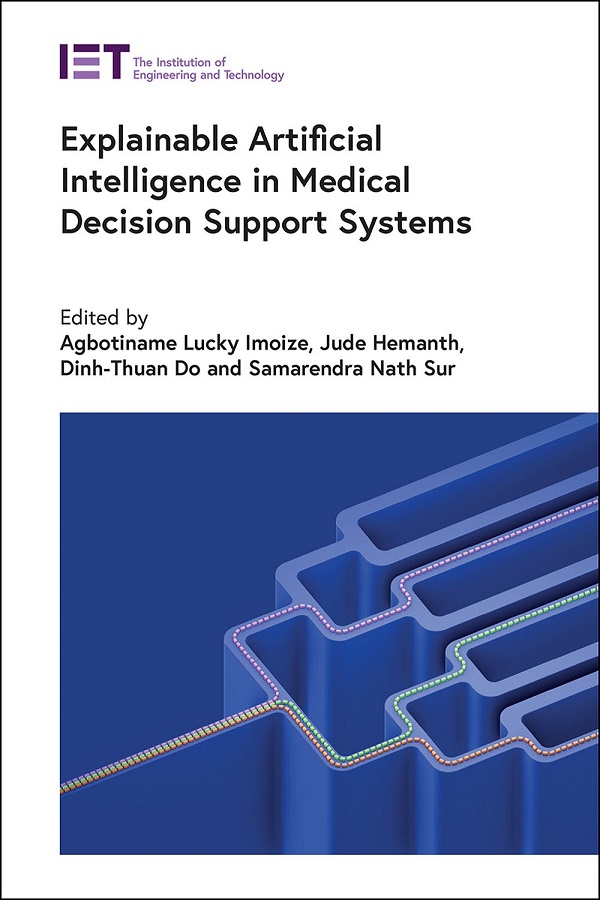- Agricultural Engineering and Technology
- Applied Physics
- Built Environment
- Computing and Networks
- Control, Robotics and Sensors
- Electrical Regulations
- Electromagnetics and Radar
- Energy Engineering
- Healthcare Technologies
- History and Management of Technology
- IET Codes and Guidance
- Manufacturing
- Materials, Circuits and Devices
- Model Forms
- Security
- Telecommunications
- Transportation

Explainable Artificial Intelligence in Medical Decision Support Systems
Edited by Agbotiname Lucky Imoize, Jude Hemanth, Dinh-Thuan Do, Samarendra Nath Sur
Medical decision support systems (MDSS) are computer-based programs that analyse data within a patient's healthcare records to provide questions, prompts, or reminders to assist clinicians at the point of care. Inputting a patient's data, symptoms, or current treatment regimens into an MDSS, clinicians are assisted with the identification or elimination of the most likely potential medical causes, which can enable faster discovery of a set of appropriate diagnoses or treatment plans. Explainable AI (XAI) is a "white box" model of artificial intelligence in which the results of the solution can be understood by the users, who can see an estimate of the weighted importance of each feature on the model's predictions, and understand how the different features interact to arrive at a specific decision.
This book discusses XAI-based analytics for patient-specific MDSS as well as related security and privacy issues associated with processing patient data. It provides insights into real-world scenarios of the deployment, application, management, and associated benefits of XAI in MDSS. The book outlines the frameworks for MDSS and explores the applicability, prospects, and legal implications of XAI for MDSS. Applications of XAI in MDSS such as XAI for robot-assisted surgeries, medical image segmentation, cancer diagnostics, and diabetes mellitus and heart disease prediction are explored.
About the Editors
Agbotiname Lucky Imoize is a lecturer in the Department of Electrical and Electronics Engineering at the University of Lagos, Nigeria and a research scholar at Ruhr University Bochum, Germany. He is a Fulbright fellow, a senior member of the IEEE, and a registered engineer. He has published over 90 articles and conference papers, two edited textbooks, and five book chapters. His research interests are 6G wireless communication, artificial intelligence, and the Internet of Things.
Jude Hemanth is a professor at Karunya University, Coimbatore, India. He has delivered more than 100 keynote talks and invited lectures at international conferences and workshops, and has authored more than 100 research papers and 27 edited books. His research areas include computational intelligence and image processing.
Dinh-Thuan Do is a research scientist in the Department of Electrical Engineering, University of Colorado Denver, USA. He won a Golden Globe Award from the Vietnam Ministry of Science and Technology in 2015. He has published over 200 journal and conference papers, one textbook, two edited books and eight book chapters. His research interests include signal processing in wireless communications networks, full-duplex transmission, and energy harvesting.
Samarendra Nath Sur is an assistant professor in the Department of Electronics & Communication Engineering at Sikkim Manipal Institute of Technology, India. His research interests include wireless communication, signal processing, and remote sensing. He has published more than 77 SCI/Scopus indexed international journal and conference papers, four edited textbooks, and five book chapters. He is a senior member of the IEEE and associate member of the Institution of Engineers (India) (IEI).
Publication Year: 2022
Pages: 545
ISBN-13: 978-1-83953-620-5
Format: HBK
Editors: Agbotiname Lucky Imoize, Jude Hemanth, Dinh-Thuan Do, Samarendra Nath Sur
